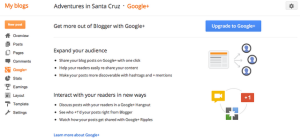 There’s now some tighter integration between Google+ and Blogger with new functionality introduced today that prompts you to share the new Blogger post you just published with your Google+ network.
There’s now some tighter integration between Google+ and Blogger with new functionality introduced today that prompts you to share the new Blogger post you just published with your Google+ network.
This is mildly interesting – the only thing that’s surprising about it is that Google is continuing (for now) to support Blogger instead of completely switching everything over to Google+ – but does open up a raft of thoughts about how publishers promote their work on social networks.
Right now I’m using (obviously) WordPress and have that platform’s Twitter tool installed so that this post, when it’s published, will be distributed there automatically. Similar tools are available for Facebook and other networks, all of which are focused around giving the publisher control. But right now Google is the only one company that owns both a long-form publishing platform *and* a social network, meaning it can make that integration even tighter and, as I allude to above, I wouldn’t be at all surprised if at some point down the road the two tools are merged into one.
More than anything though this news, combined with Hootsuite’s announcement that they were finally opening up Google + Pages access to all levels of their users, shows that Google realizes there needs to be *some* level of automation to the publishing on their social network. Yes, there might have been a massive user growth spurt in the last couple months and some brands are having great success there, but enterprise level users in my experience like having a single publishing dashboard so they’ll have to continue to meet that need.
What will now be interesting to see is what sort of additional tools Google does or doesn’t add for other, non-Blogger platforms that encourages people and publishers to promote their work on Google+.

